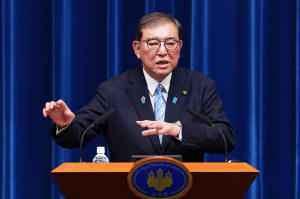|
Ishiba told reporters he is willing to fly to Washington to
negotiate directly with Trump. The U.S. will begin collecting
25% tariffs on auto imports on Thursday, with taxes on
fully-imported cars kicking in at midnight, U.S. time. The
tariffs are set to expand to applicable auto parts in weeks to
come.
So far, Japan has not managed to win exemptions from the tariffs
hitlist despite its status as the biggest U.S. ally in Asia.
Japan has stepped up cooperation with other countries that also
are being affected. Japanese Trade Ninister Yoji Muto flew to
Seoul to meet with his counterparts from South Korea and China
and agreed to promote a free and fair trade and investment,
saying Trump’s trade policies are fueling protectionism.
The higher tariffs are a worry for Japan and major automakers
like Toyota Motor Corp. and Honda Motor Co. Their exports to the
United States are a major driver for the Japanese economy. A
quarterly survey by the Bank of Japan released Tuesday showed
business sentiment among large manufacturers worsened in the
past quarter for the first time in a year.
“I don’t mind going to Washington, if necessary," Ishiba said.
He said officials from all related ministries, including
foreign, trade and finance, are working “day and night,” to
negotiate with their U.S. counterparts to resolve the issue.
"When I see the overall picture and judge that it is appropriate
for me to go, I must do so without hesitation, he said.
If the tariffs are imposed, he said the government will do what
it must to minimize their impact on Japanese industries and
jobs.
As short-term measures, the government plans to set up 1,000
consultation windows across the country to respond to concerns
of small to medium-size auto parts makers and other
manufacturers that would be affected by the U.S. tariff
increase.
In case of damage to actual businesses, the government will do
its utmost to support cash-strapped business owners, Ishiba
said.
All contents © copyright 2025 Associated Press. All rights reserved

|
|




